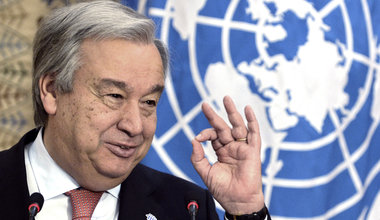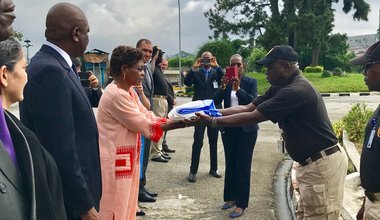Daily Brief on Côte d’Ivoire for Friday, 7 November 2008
Highlights
- Lack of offices and accommodation hinders work of redeployed civil servants
- DFC discusses security plan for identification with Ivorian Chiefs of Staff
- Hospital staff targeted for attack in Bouaké
Redeployment of administration
The Prefet of Kounahiri in the centre west region of Côte d'Ivoire has told UNOCI that redeployed civil servants in his area are finding it difficult to resettle due to lack of accommodation. Citing the Director of Agriculture as an example, he said that the director still did not have an office or a house. He has therefore been forced to use part of the prefecture with the Prefet's agreement. In response to the Prefet's complaints, the National Committee for the Redeployment of the Administration (CNPRA) has asked the Armed Forces of the Forces Nouvelles (FAFN) to move out local government buildings it is occupying and return them to the State. The Prefet also complained of strained relations with FAFN soldiers, whom he said hinder the free movement of people and goods. He said that a Food and Agriculture Organisation (FAO) convoy was recently stopped by them and was only released upon the intervention of the Sous Prefet.
Military
UNOCI's Deputy Force Commander, Brigadier-General Elhadji Mouhamadou Kandji, today met with the Chiefs of staff of the Defence and Security Forces of Côte d'Ivoire (FDSCI) and the FAFN, Generals Philippe Mangou and Soumaila Bakayoko at the Integrated Command Centre (ICC) in Yamoussoukro (centre) to discuss the security plan for the identification and voter registration operation. The Licorne Force Commander also attended the meeting.
Security
The head of Bouake's University Hospital (CHU) yesterday met representatives of the Forces Nouvelles (FN) to discuss the issue of his staff being targeted by motorcyclists who provide public transportation. He said that his staff had reported a marked increase in these types of attack in Bouaké and would like the FN authorities to take the necessary measures to put a stop to them.
Arms Embargo
Arms embargo inspections were yesterday successfully carried out by UNOCI peacekeepers at the National Armed Forces of Côte d'Ivoire's (FANCI) regrouping site in Abengourou (east) and at its Gendarmerie Brigade in Tiebissou (centre).
Human Rights
The Human Rights Division is closely following the case of the editor-in-chief of a daily newspaper, l'Intelligent d'Abidjan, Mr. Alafé Waliki alias Alafé Assé, who was arrested on 3 November 2008 for alleged nationality fraud. Mr. Alafé, who is also a candidate for the presidency of the journalists union, Union Nationale des Journalistes de Côte d'Ivoire (UNJCI), is being held in the main prison in Abidjan.
The Regional Human Rights Office in Daloa is following up the case of a 14-year-old Burkinabé girl who fled her home in Nemenefla, 70 km north of Daloa (centre west), to escape a forced marriage to a Burkinabé man who is already married and is the father of five children. The girl sought shelter at Notre Dame Parish in Vavoua, 55 km north of Daloa.
The Regional Human Rights Office in Daloa has organized training on the rights of men, women and children for 16 leaders from literacy centres in the Daloa area. The Office also presented its mandate and details of the Universal Declaration of Human Rights, International Convention on the Rights of Children and the Convention on the Elimination of Discriminations against Women.
Following reports that a ten-year-old girl had been raped by a 35-year-old man in the area, the Regional Human Rights Office in Odienné held a working session with the Secretary-General of Denguélé Préfecture to discuss the issue of violence against women and girls. The Office also raised the fact that the FN authorities are reported to have have taken no action against the alleged perpetrator. As cases of violence against women including forced marriages, are quite common in the region, it was agreed that the Office, in collaboration with the sous préfets and the African Union Club, would organize human rights training with particular emphasis on women's rights, in all the 14 sous- prefectures in the region.
 ONU
ONU Nations Unies Maintien de la paix
Nations Unies Maintien de la paix



